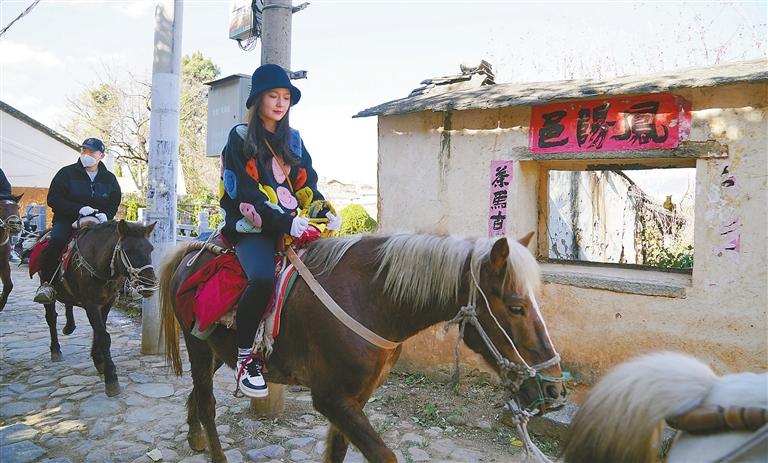

TOURISTS taking selfies have lined the roads of Fengyangyi Village in Southwest China’s Yunnan Province since the romance drama “Meet Yourself” was filmed there, garnering more than 3.8 billion views. The drama tells the story of a woman who, after the death of her best friend, quits her job as an urban office lady and travels to Yunnan, a top tourist destination in China, where she enjoys a slow life and falls in love with an entrepreneur. Scoring 8.6 out of 10 on China’s leading film rating platform Douban, the TV series, set in a beautiful mountainous landscape, satisfies its audience’s desire to watch rural life unfold and find inner peace. It has led scores of fans to try everything that the main characters experience in Yunnan. The Dali Bai Autonomous Prefecture is home to many of the show’s filming locations, including Fengyangyi Village. Dali recorded nearly 4.24 million tourist visits during this year’s Spring Festival holiday, up 219% year on year, according to its culture and tourism bureau. Its tourism revenues during the holiday hit 3.16 billion yuan (US$ 455 million), up 162% year on year. Rural tourism industries such as catering and hospitality in Dali have ushered in a new chapter of development. “I watched every episode of the TV series, and my focus changed from the leading roles to the idyllic lifestyle in Yunnan,” said Li Hui, a tourist who traveled to Dali from Chengdu, Sichuan Province. Wang Yichuan, vice chairman of the China Literature and Art Critics Association, said the drama warms the hearts of its audience with the beauty of rural China. The hit TV series also presents the charm of some intangible cultural heritage items in Dali. Jianchuan wood carving, originating from Jianchuan County of Dali in Yunnan, has a history of more than 1,000 years. It has rich ethnic culture connotations, fuses bold and delicate styles together, creating unique charm, and was listed in the national-level intangible cultural heritage in 2011. Episodes in the TV show discuss how machines are taking place of handwork and the cultural inheritance of the traditional craft of wood carving is facing challenges. Tie-dyeing is a traditional staining technique among the folks. The tie-dyeing technique of the Bai ethnic group was listed as a national intangible cultural heritage in 2006. The dyestuff is derived from the pure plant of isatis root, and the final color will be blue and white, the representative color of Bai tie-dyeing, appearing primitive and elegant. Now the tie-dyeing has fused modern aesthetic elements. The embroidery is also popular among the women inhabiting in the Bai ethnic group areas. Each piece of embroidery is an exquisite artwork, which has high ornamental values. The embroidery technique of the Bai ethnic group, with mature techniques and abundant colors, was listed as a provincial-level intangible cultural heritage in 2009. There are not only crafts shown in the TV drama, but also some local food featuring intangible cultural heritage items wetting the audiences’ appetite. Flower cakes are no doubt the most symbolic specialty of Yunnan. It is a kind of traditional cake with a history of more than 300 years. The warm climate in Yunnan provides superior conditions for growing flowers. A handful of rose petals are wrapped in a round cake with a golden surface, which tastes crisp, and after taking one bite, the fragrance of rose pervades, leaving endless aftertastes. Dairy fans are a kind of popular snack made of milk and yogurt, shaped like a fan, and mainly produced in Dali. It can be eaten raw, dry, fried or toasted, or cooked with other ingredients such as Yunnan ham. As a local specialty, it’s a must-try food for tourists visiting Yunnan. The making technique of dairy fans has been listed as a provincial intangible cultural heritage item in 2022. The three tea courses are a special way of tea-serving etiquette of the Bai ethnic group. Originating from the Ming Dynasty (1368-1644), it has been an important tradition during special occasions such as weddings, funerals and festivals. Sugar, dairy fans, ginger, cinnamon and honey along with the tea create a rich aftertaste. The three courses imply the life philosophy of first bitter, second sweet and finally colorful. The tea practice was listed in the national intangible cultural heritages in 2014, and was added to UNESCO’s Representative List of the Intangible Cultural Heritage of Humanity in 2022. “After the TV series was aired, the daily number of visitors to Fengyangyi Village increased from below 100 to nearly 10,000,” said Chen Qin, an official of Liuguanchang Village, which administers Fengyangyi. Chen said that through the integration of rural revitalization and the film and TV industry, Fengyangyi has embraced rapid development in its culture and tourism industry, which has promoted local employment and entrepreneurship. The Shaxi ancient town in Dali’s Jianchuan County, another of the show’s filming locations, received 141,800 tourist visits during the Spring Festival holiday, up 237.02% year on year, with tourism revenues growing nearly 188% to 110 million yuan. Zeng Jirong, a fine art graduate, was a photographer in Guangzhou before moving to Dali in 2018. “Rural life has become a never-ending source for my works,” said Zeng, who has established an illustration studio in Dali. (Xinhua, China Daily) | 
